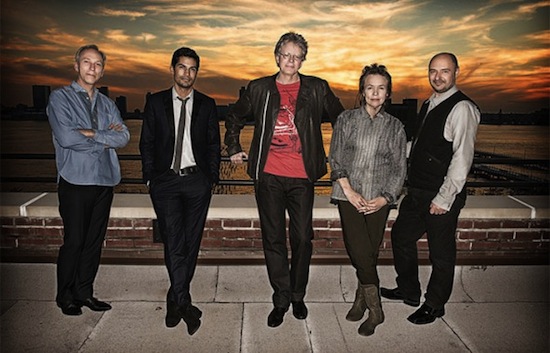Whether the result is a gentle meditation or a cathartic outpouring, art is a reliable means of navigating tragedy. Once that art is committed to the medium of choice, the therapeutic work has been done, and it’s a tough job for a critic to poke the result with a stick and ask whether it’s aesthetically successful. Laurie Anderson’s newest composition, Landfall, is just that; the violinist and multimedia performance artist’s reflection on the impact of Hurricane Sandy on her home turf of New York City in late 2012. The result is sometimes gripping, often quite disjointed.
Landfall is Anderson’s collaboration with renowned San Francisco string ensemble The Kronos Quartet, and had its world premiere in February 2013 at the University of Maryland. Over a year later, and after several performances across the globe, Landfall finally made its first appearance in Los Angeles, on March 16, 2014 at Royce Hall on the UCLA campus. The previous evening, Kronos kicked off its two-night stint in L.A. at the same venue, performing works by Penderecki, John Oswald, and Philip Glass to help celebrate the group’s 40th anniversary. However, as the piece’s composer and guiding spirit, Landfall is very much Anderson’s baby.
It would be easy to group the piece’s thematic detours as part of the overall sense of fragmentation, but most of them do serve the Sandy motif well. When Anderson speaks of struggling to remember the names of galaxies, or marvels at Earth’s disappearing species, she reminds us how insignificant humans are, and how little we seem to appreciate what’s around us. When she says we can’t hurt the stars in the sky, it’s a powerful reminder of the things we have damaged; it’s possible she’s drawing a connection between that damage and the man-made climate change that has caused an uptick in extreme weather events such as Sandy. Loss is clearly at the forefront of Landfall, and the recent passing of Anderson’s husband, Lou Reed, has added an unspoken but present element of grief as well.
Less effectively, Landfall concerns itself with technology and communication. An interactive software called Erst allows Kronos and Anderson to turn their music into triggered symbols on a screen; the audience sees dingbats, infographics, and strings of letters. It doesn’t serve much narrative purpose other than to remind viewers that it exists, or to support Anderson’s anecdote of post-globalisation confusion at a Dutch karaoke bar with Korean videos and malfunctioning machines. It might be more compelling if Landfall‘s subtle, intermittent electronics illustrated this by being harsher and glitchier, but they wouldn’t be as crowd-pleasing, either. (Anderson and Kronos, collectively, take three bows in response to the standing ovation.)
Kronos’ playing is lovely: a plucked string to signify rain, perhaps, or a bent note for a swaying tree. The quartet has mastered dynamics and restraint; their best moments are quiet evocations rather than tempestuous bluster. The composition is perhaps what holds the group back. Movements don’t transition well; the stops and starts feel more like pop songs switching over on a jukebox than rests in a somewhat lengthy work. Anderson and Kronos know as well as anyone that pop has a place in "serious" music, but crossover appeal on its own isn’t enough to salvage something that just doesn’t sound right. Even at only 70 minutes, Landfall seems padded out, which Royce Hall’s coach-class size seats don’t help. It’s a stark contrast with the LA Opera’s October 2013 riveting staging of Philip Glass’s Einstein On The Beach, which, at four and a half hours, doesn’t waste one second.
For Landfall‘s year-long journey, it doesn’t seem finished yet. It’s curious that no official CD or DVD release has surfaced. Maybe its creators realise it would benefit from a bit of retooling; maybe it’s meant to be taken as a work in progress. If so, Anderson and Kronos owe it to audiences to make that explicit. It could be an absorbing rumination on loss and fragility, a meaningful therapeutic gesture, but as it stands now, it’s not ready for primetime.


